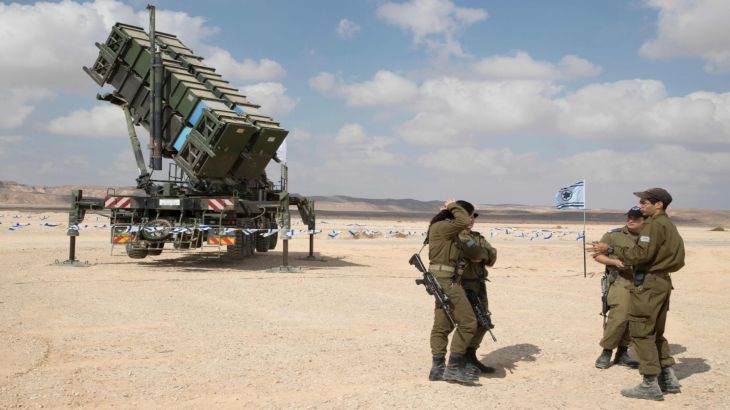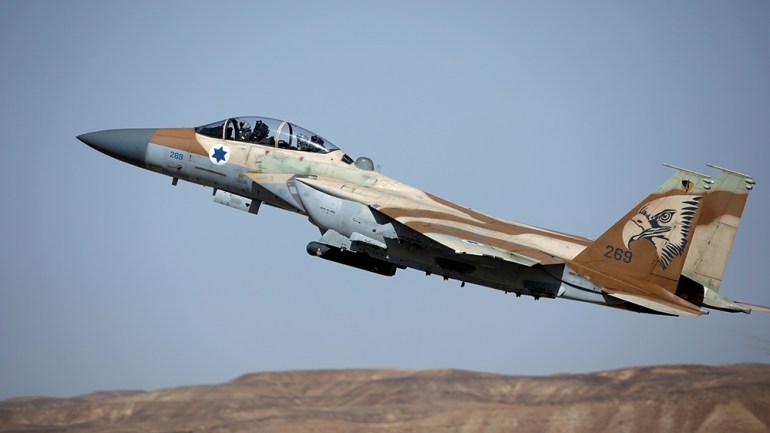What next as Israel steps up attacks on Iranian forces in Syria?
A spate of deadly Israeli air raids and other attacks have created a conundrum for Iran and its intentions in Syria.

While Israel has worked to counter Iran’s efforts to extend its influence in Syria for a decade, recent developments indicate an increased push to eradicate the Iranian presence, raising questions about what comes next.
Israel’s latest wave of attacks on January 12 in eastern Syria was broad and precise. A total of 18 positions – mostly militias supported by Iran – were hit about 600km (320 miles) from Israel’s border. It marked the fourth attack attributed to Israel in a two weeks.
Keep reading
list of 4 itemsRussia-Ukraine war: List of key events, day 785
The Take: After Iran struck Israel, how did Jordan and Lebanon react?
The world cannot turn its back on Sudan and its neighbours any longer
Iran, a major supporter of President Bashar al-Assad’s regime, has built a significant military presence in Syria since the civil war began in 2011. The build-up of forces has been regarded by Israel as a threat to its national security.
Although officially neutral in Syria’s civil war, Israel has continuously conducted air raids against what it says are Iranian targets since 2012, a strategy to stop Tehran and its proxies from elevating their influence in the region.
Syria remains of crucial importance to Iran as it plays a key logistical role in enabling Iran to provide support to the Hezbollah movement in Lebanon, Simon Mabon, professor of international politics at the University of Lancaster, told Al Jazeera.
“If Assad had fallen, it would have posed a serious challenge to the provision of logistical support,” Mabon said.
Israel has become more forceful in its efforts to counter Iran’s presence since al-Assad’s military victory over various rebel forces raised fears that Tehran could essentially attack Israel from three sides in the event of an armed conflict.
In such a scenario, Israel would not only face Syria but Hezbollah, sponsored by Tehran, on its northern border and Hamas in Gaza in the south.

‘Multiple clandestine missions’
Recently, there has been a significant shift in the number of attacks. Israel seldom comments on the raids, and therefore reliable figures are difficult to obtain. However, the Israeli army’s Chief of Staff General Aviv Kochavi recently said Israel had struck more than 500 targets in 2020 “on all fronts in addition to multiple clandestine missions”.
The timing of the most recent attacks, which overlaps with the final days of the Trump administration, was particularly noteworthy, Nader Hashemi, director of the Center for Middle East Studies at the University of Denver, told Al Jazeera.
“It is a direct result of an Israeli foreign policy goal of getting the United States to attack Iran on Israel’s behalf,” said Hashemi.
Indeed, prior to the attacks launched on January 12, Israel conducted a raid in the south of Syria, in close proximity to the capital Damascus on January 7. Reports said three pro-Iran fighters were killed.
According to Israel, its main objective appears to have benefitted from the intensification, according to Kochavi: “Iran’s entrenchment in Syria is slowing down as a result.”
However, Hashemi said the raids’ effectiveness remains unclear. “What is apparent is that Iranian assets have been repeatedly targeted with impunity.”
While he acknowledged Israel’s stepped-up military efforts, he said he does not believe it automatically equates to a successful operation.
“Iran has attempted to downplay its presence in Syria, largely because this is very unpopular back in Iran, so the actual number of dead IRGC [Islamic Revolutionary Guard Corps] soldiers and commanders has never been publicly revealed,” said Hashemi.
Moreover, Iran will increasingly anticipate Israeli attacks and take the necessary precautions to limit casualties, particularly as “there are limits to what Israel can do from the air”, he added.
Nonetheless, the deadly air raids have created a conundrum for Iran and its intentions in Syria.
A balancing act
Iran’s efforts to advance its interests in Syria are not military only. Tehran has invested in the country’s education system, building secondary schools and opening universities across Syria.
It has also set up medical centres that distribute COVID vaccines and masks to Syrians in response to the pandemic.
This is an approach Iran has utilised for many years throughout the Middle East, and which it is now using in Syria:
“Teheran has a vast experience of engaging in cultural diplomacy across the region, notably in Lebanon, where it has developed a good deal of influence through soft power,” Mabon said.
With a reported allocation of $20-$30bn over the past decade, Syria has been a costly endeavour for Iran.
Considering the country’s perilous economic situation, this raises the question of how long Tehran’s overseas activities can be sustained in the region – particularly in light of Israel’s determination to check them.
Iran’s domestic circumstances notwithstanding, however, one should not expect a departure from Syria anytime soon, analysts say.
“Iran has faced serious economic challenges before, but it continues to fund Hezbollah in Lebanon and provides support to PMUs [Popular Mobilisation Forces] in Iraq,” Mabon noted.
Its engagements remain “inherent within Iran’s foreign policy goals” but considering Israel’s dedication to countering Iran’s presence, it “leaves Tehran’s regime with a difficult balancing act to engage with”, he said.
Besides the economic aspect, Iran is also facing a vacuum in military leadership after its top foreign operations commander, Qassem Soleimani, was assassinated in a US drone strike in January 2020.
Soleimani’s death has “undermined Iran’s position both in Syria and Iraq,” Afshin Shahi, senior lecturer in Middle East politics at the University of Bradford, told Al Jazeera.
“Soleimani had the ability to build alliances and run asymmetric warfare unrivalled in the region,” traits his successor Esmail Qaani lacks, which is “excellent news both for Israel and its new Arab allies in the Middle East”, said Shahi.
Israel-Iran conflict: What next?
With limited leeway on either side to pivot from their respective objectives, a swift conclusion to the Iran-Israel conflict in Syria or a change in strategy remains inconceivable.
“I do not see any changes forthcoming,” Hashemi said. “At most, there might be a reduction in the intensity and regularity of these attacks given that [US President] Joe Biden has zero interest in going to war with Iran, but I do not see these bombing raids halting altogether.”
This is borne out by Israel’s minister of defence, Naftali Bennett, stating unequivocally Israel’s intention to “not stop” its military efforts until it has forced Iran out of Syria.
And while Tehran is nowhere near close to ceasing its entanglement in Syria, Israel has undoubtedly made its involvement uncomfortable and costly for Iran.